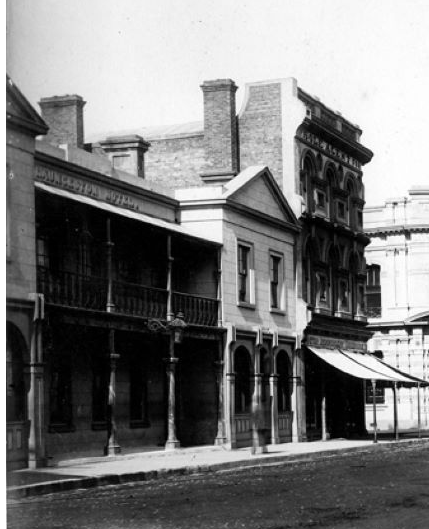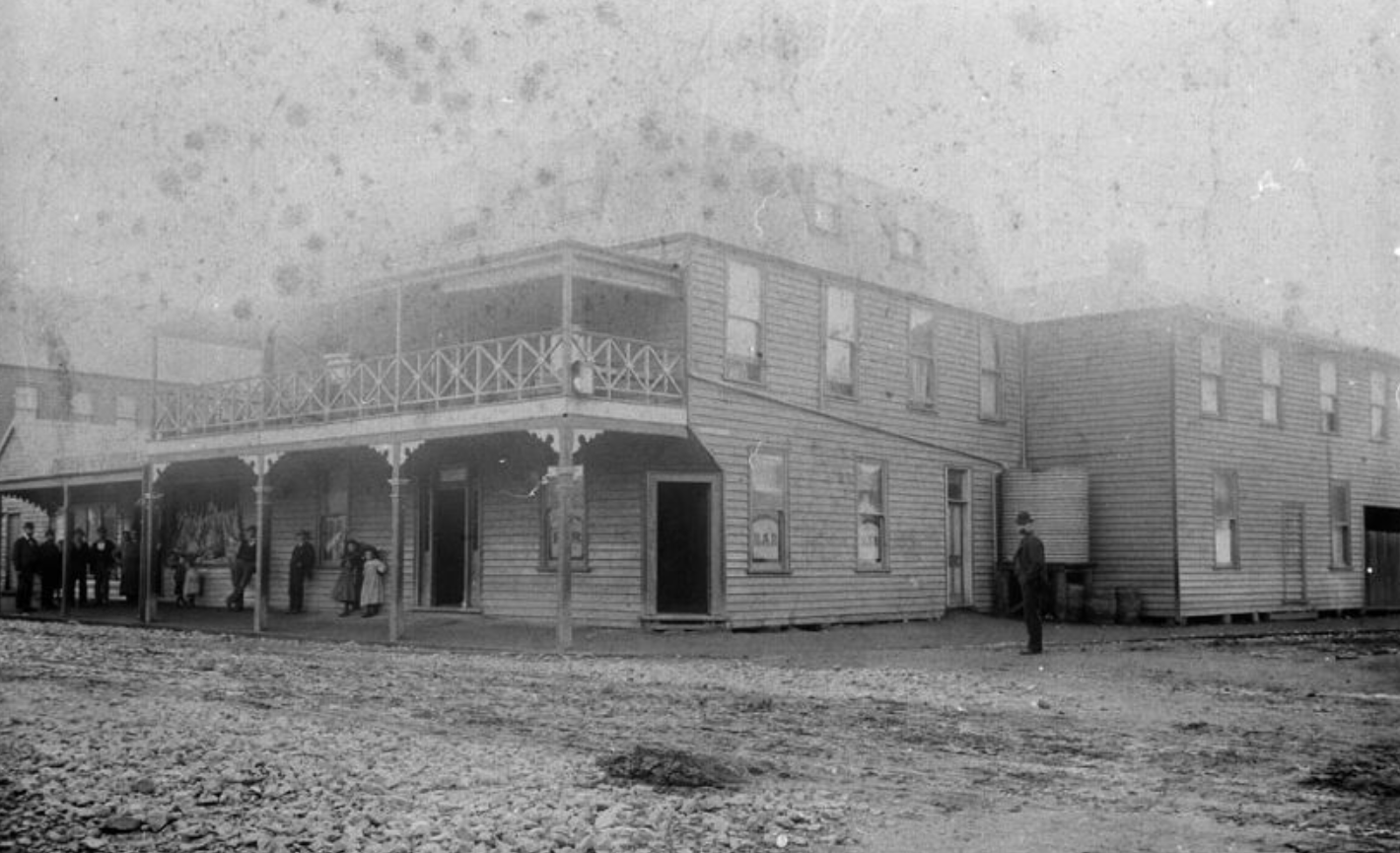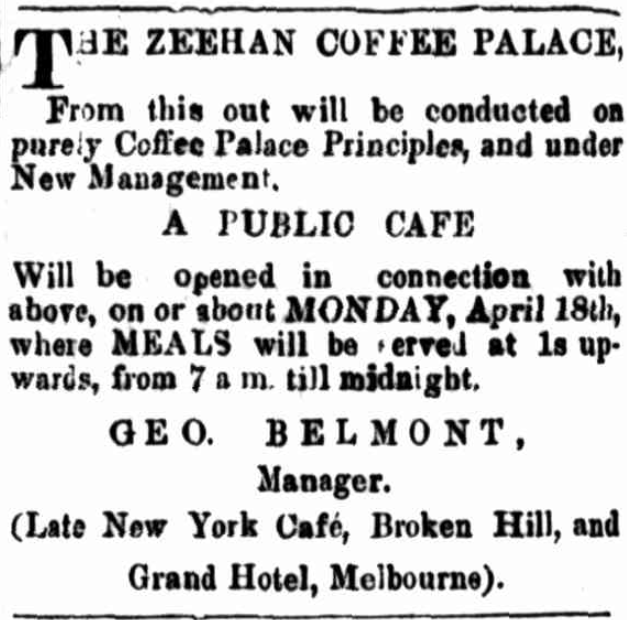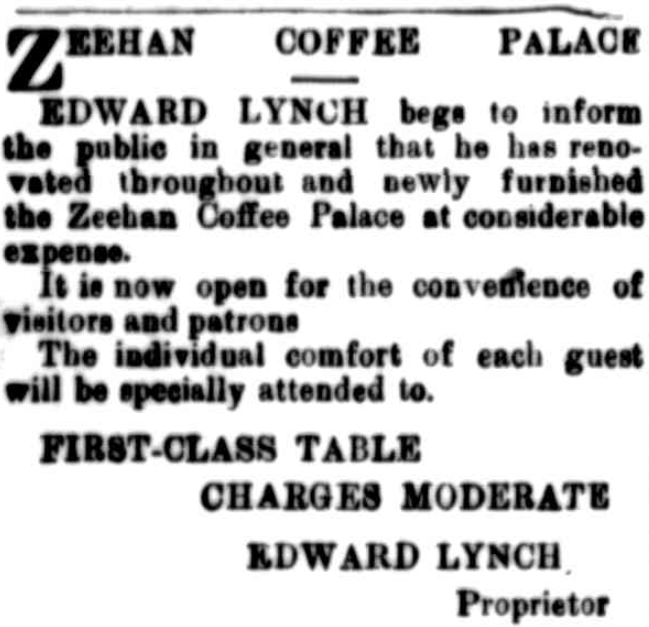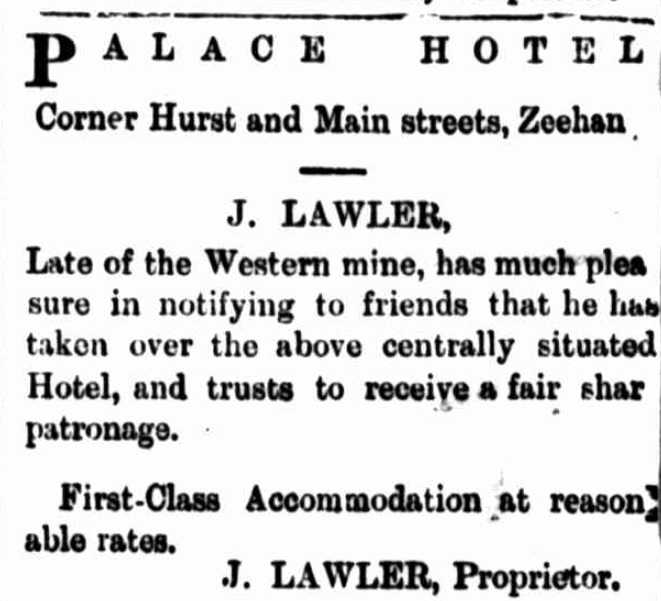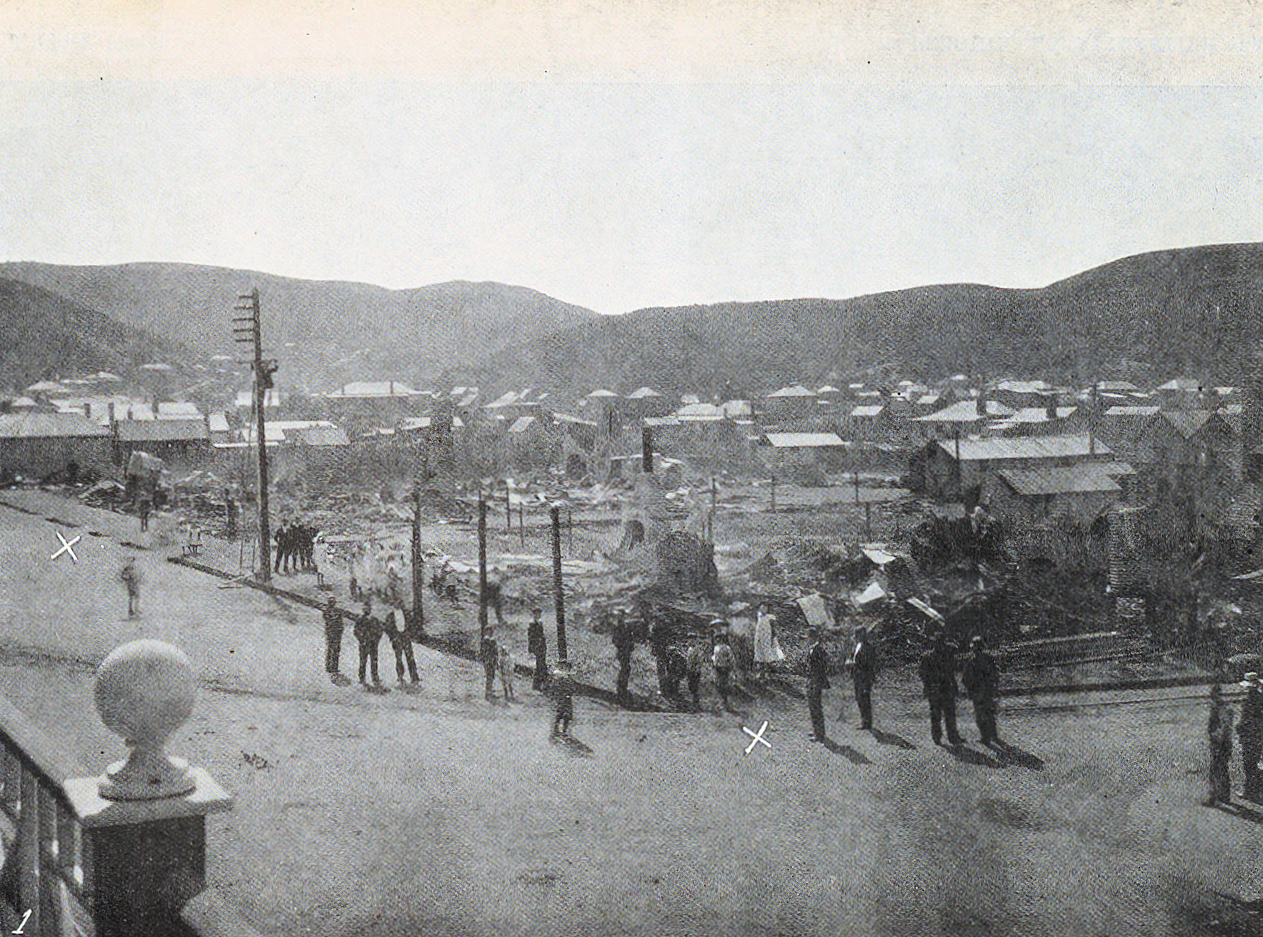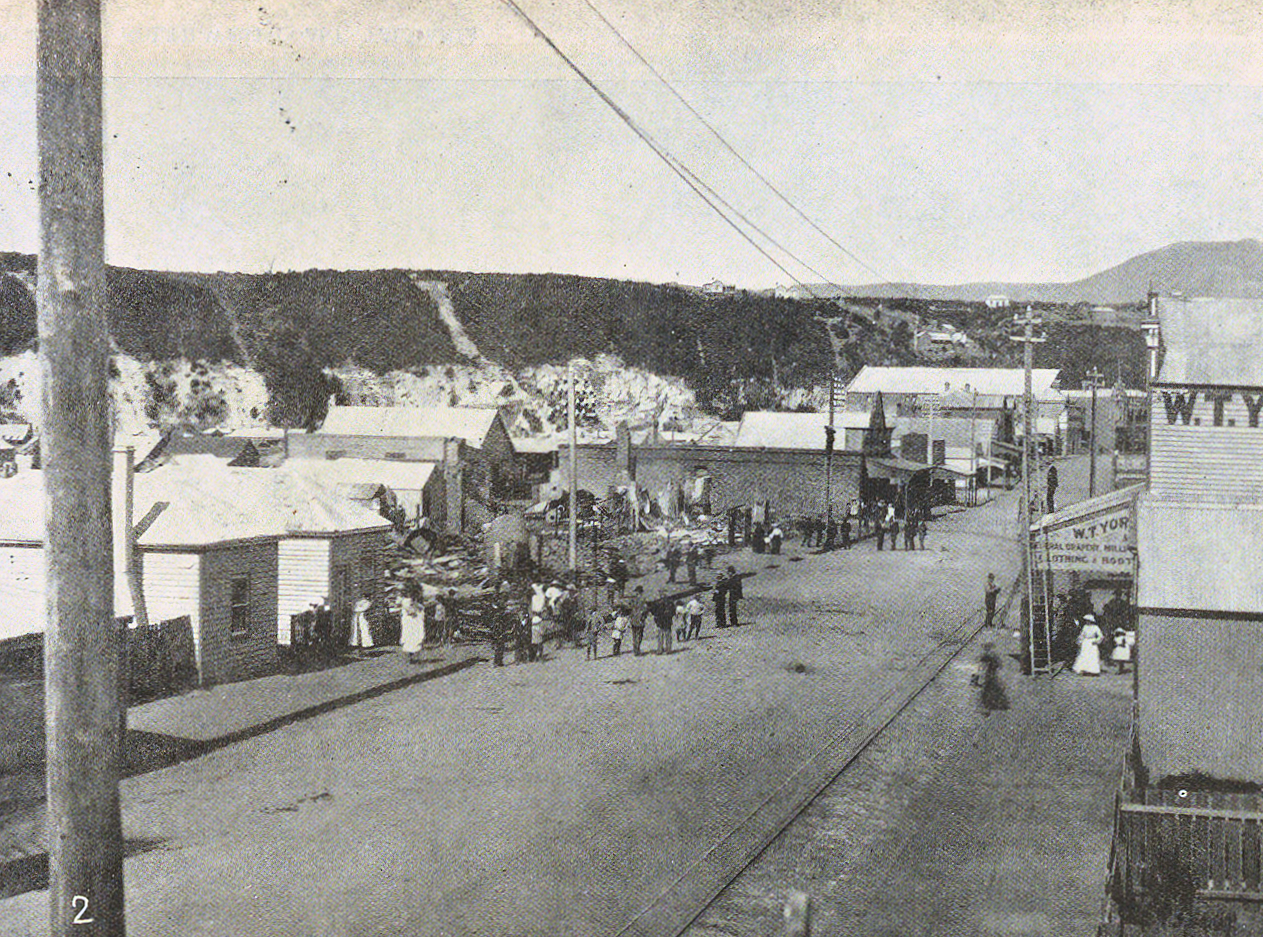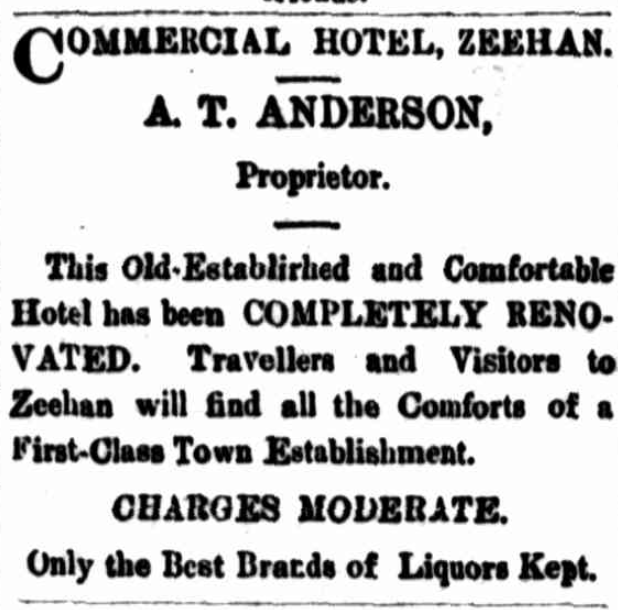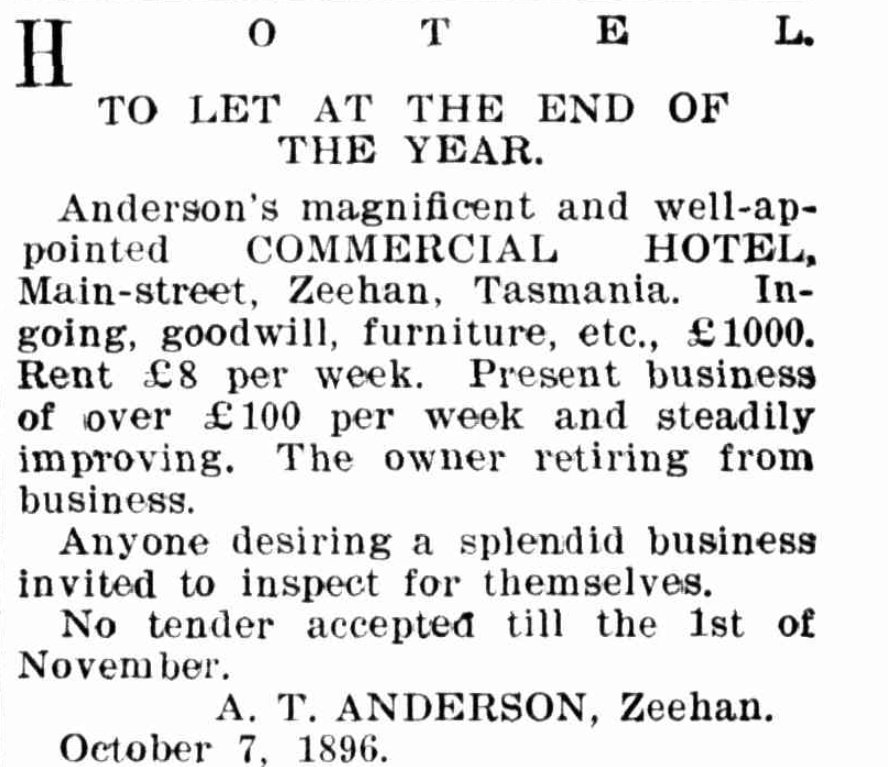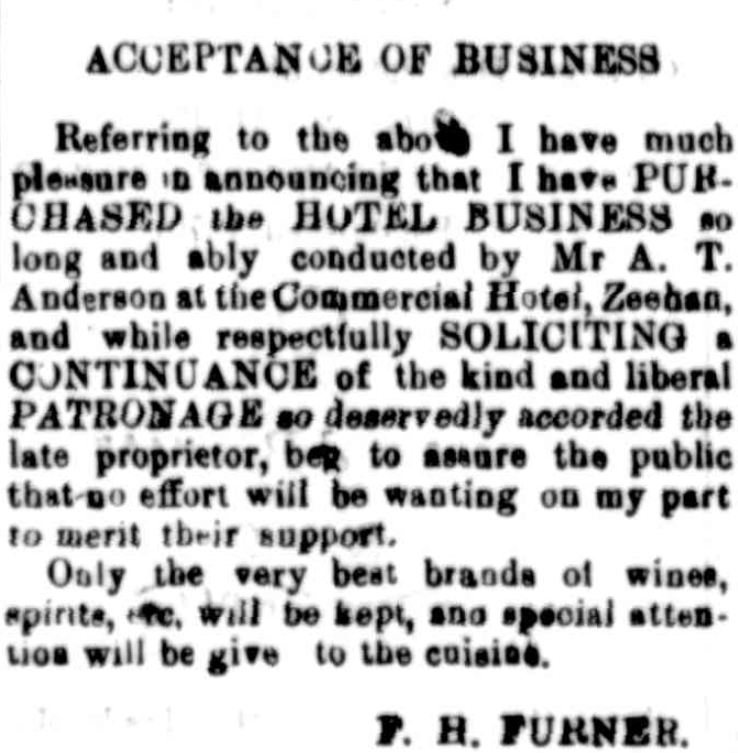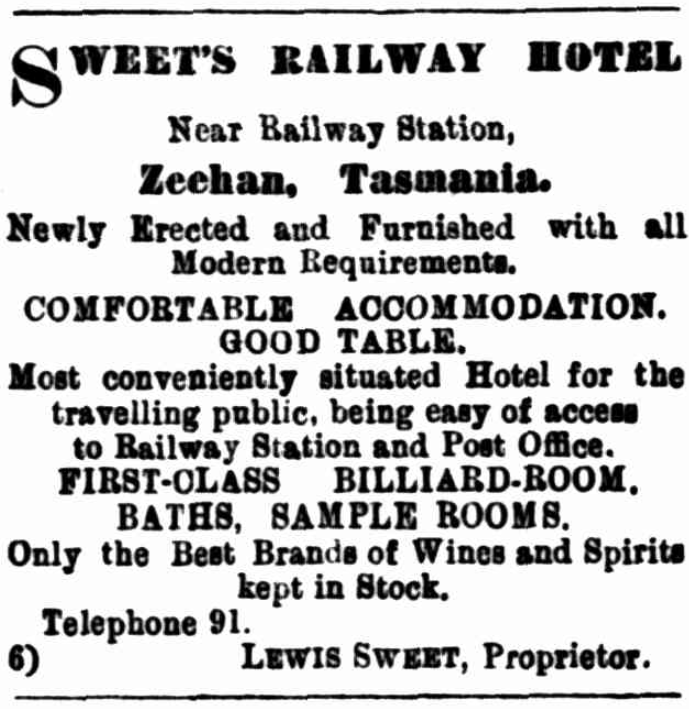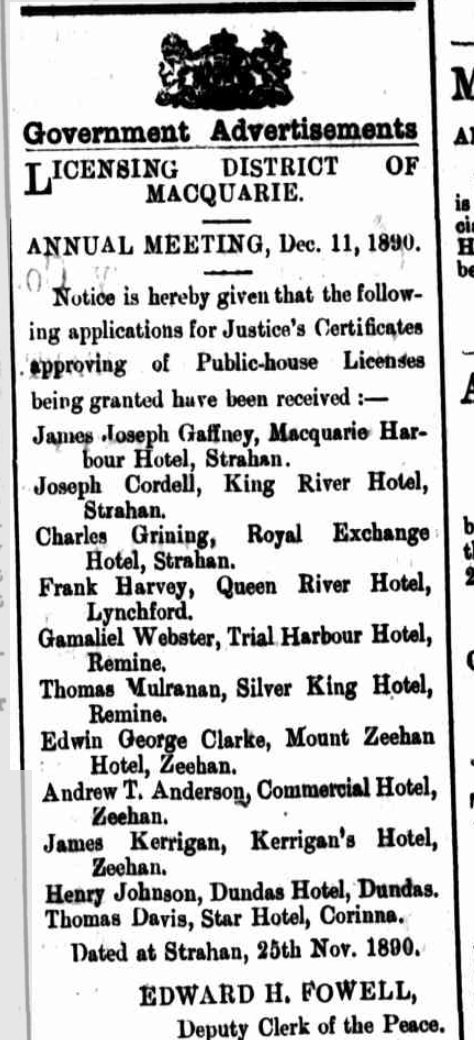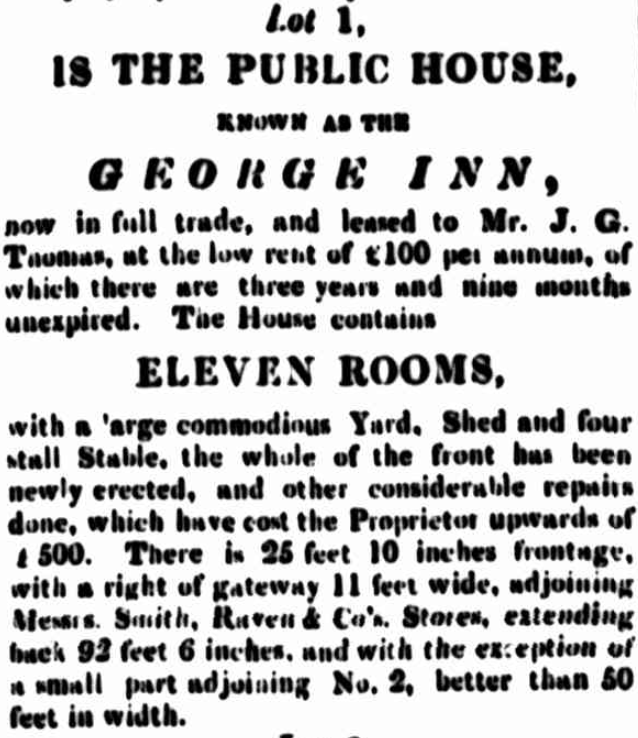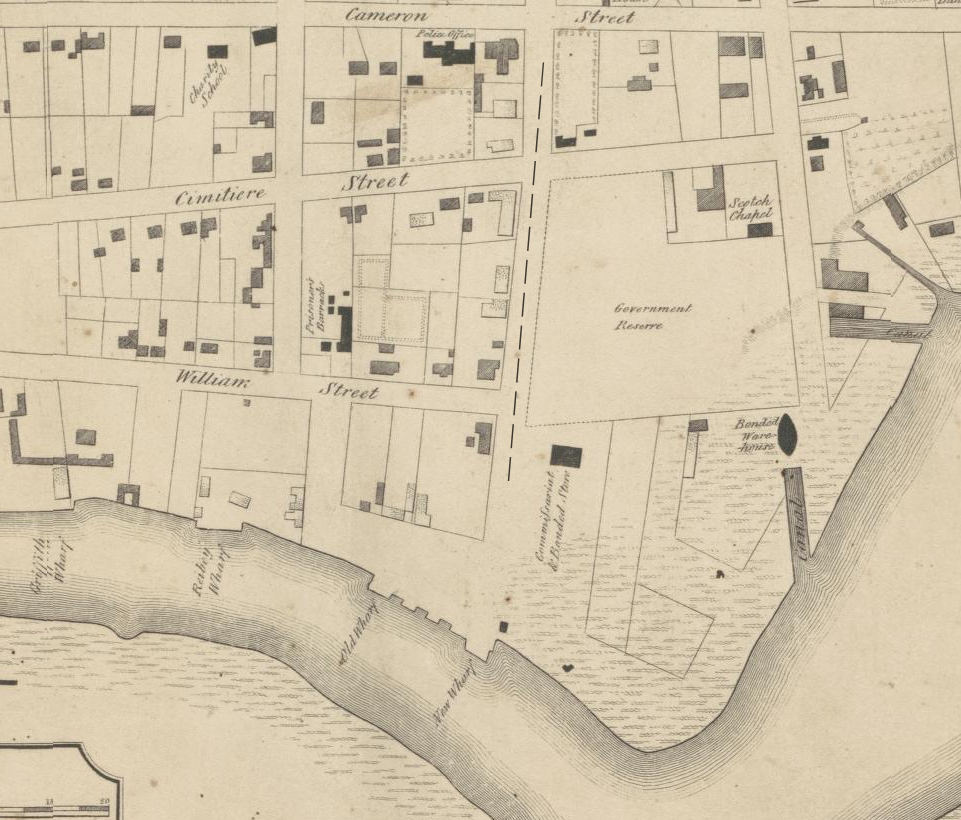1989-90 Thoms. H. Anderson, Mount Zeehan Hotel, Mount Zeehand
1890 Rich & Bowne, Mount Zeehan Hotel, Mount Zeehan
1890-98 Edwin George Clarke (Mount) Zeehan Hotel, Zeehan
1898-03 Henry Edward Kittson, Zeehan Hotel, Zeehan
T. H. Anderson applied for a license for a new hotel at Mount Zeehan. Mr. Crisp appeared in support of the license being granted. Petitions from the inhabitants of Mount Zeehan, and certificates of charioteer from merchants and others in Launceston were put in. The Sub-inspector of Police stated that he had . visited the promises which were not quite finished, but would be, completed by January 1, 1889. A telegram from Mr. Superintendent- Armstrong stating that the applicant was a fit and proper persons to keep an hotel, was also put in ; and there being no objection by the police the license was accordingly granted at reduced fee, £12 10s.
The Mercury, 10 December 1888
After a glance at the Mount Zeehan’s main shaft a substantial piece of work-and a brief rest at Anderson’s Mount Zeehan Hotel, [the State Treasurer and Minister of Lands] returned to Trial Harbour, but their work was not over yet. Trial Harbour, or as it is now gazetted, Remine, is going ahead, and its small population seem to be particularly pushing
The Mercury, 24 December 1888
A short distance beyond the Silver Queen are the Mount Zeehan Silver Lead Mining Co.’s two sections, containing 120 acres. It is on one of these sections that the Mount Zeehan Hotel is situated, and the beginnings of a township are to be found.
The Mercury, 14 March 1889
Signs of progress are now visible in all quarters. Since my arrival a large store has been erected for Messrs. R. Kennan and Co.. who are doing a good business : also another store finished for Messrs. J. James and Co., the latter carrying on butchering also a commodious billiard-room for Messrs. Parker and Camm adjoining the Mount Zeehan Hotel, and by the appearance of the building it is the largest on the coast : also another store in course of erection for Messrs. Fowler Bros. When those that an: in course of construction are finished, there will be in all on the present town of Mount Zeehan three stores, one hotel, one billiard room, one bootmaker’s, on barber’s, and a butchery.
Daily Telegraph, 1 April 1889
Mr. Anderson, of the Zeehan Hotel, is about putting up a building for a post and telegraph office in a very convenient position, And a petition is on the way to Hobart, praying the Government to let us have telegraphic communication, a money order office, and a savings bank.
The Mercury, 16 September 1889
More stores are going, up and the Zeehan Hotel is being greatly enlarged.
The Mercury, 28 November 1889
STRAHAN.
The annual Licensing Court was held on the 30th ult., Mr. G. H. Fowell, S.M. (chairman), and Mr. F. O Henry, J.P., officiating. The Chairman stated that the Bench had inspected the different houses, and were pleased at their appearance, accommodation, and cleanliness. Special praise was given the King River Hotel, Macquarie Harbour Hotel, Strahan, Trial Harbour Hotel, Remine, and Union Hotel, Strahan. The following licenses were granted:-Thomas Dams, Star Hotel, Corinna, Henry W. Simmons, King River Hotel, Strahan ; J. G. Gaffney, Macquarie Harbour Hotel, Strahan ; G. Webster, Trial Harbour Hotel, Remine, Charles Grining, Union Hotel, Strahan ;T. H. Anderson, Mount Zeehan Hotel, Zeehan, Frank Harvey, Queen’s River Hotel, Queen’s River, J. D. Robertson, Silver King Hotel, Remine.
The Mercury, 6 December 1889
From Trial Harbour I walked to Mount Zeehan and was much impressed with the’ activity of the place in the building trade, and in developing and opening out the silver lodes. There are some excellent shows, and when the miners have machinery to aid them & considerable quantity of ore will be raised. The best paying claim at present is Anderson’s Mount Zeehan Hotel, which is a great boon to travellers ; it is well conducted and provided with every comfort. A second hotel is nearly completed at the Government township, which will benefit that end of the mining population.
Daily Telegraph, 23 December 1889
William Rich made application for permission to sell liquors under the license of Thomas Anderson, Mount Zeehan Hotel, until the next quarterly licensing meeting Permission granted.
The Mercury, 8 April 1890
ZEEHAN, THURSDAY,
Mr. Thomas Anderson of the Zeehan Hotel, who lately sold his business to Messrs. Rich and Bowen, was last night entertained at a banquet, and presented with an illuminated address by his friends prior to his leaving the field. There was a large gathering, the managers of all the principal mines being present. The new proprietors provided an excellent spread, and the affair passed off with eclat, Mr. Anderson having been very popular with all classes. Mr. Sinclair, of the Silver Queen, occupied the chair, and Messrs. Little and Fowler acted as vice-chairmen.
The Mercury, 12 April 1890
APPLICATION UNDER LICENSING ACT. –
Mr. Anderson applied for a permit for his large and commodious hotel at Mount Zeehan, which is approaching completion. Application granted. Messrs. Rich and Bowen applied for a permit for the Mount Zeehan Hotel. Application granted.
The Mercury, 9 May 1890
Nearly opposite the shaft of the Mount Zeehan Co.’s claim, and exactly opposite the terminus of the Silver Queen Extended and the Argent Companies tramway, stands the Mount Zeehan Hotel. Until recently it was the only house of its kind in the place, and consequently always did a roaring business. The accommodation is certainly capable of improvement. It is only within the last few months that anything like privacy could be obtained. At one time the bar-parlour was the only sitting room, and there was nothing for it but to sit there or go outside Now, a private sit- ting room has been added, and decent bed rooms, and things are a little better. One rule of the establishment, and one upon the carrying out of which Messrs. Rich and Bowen, the proprietors, are to be congratulated, is that no drinks are served in the private parlour. At any rate this helps to keep the place quieter and more select. Sleeping accommodation is but meagre, and dining facilities insufficient. The latter is supplied in a long room at the rear of the main building, and very bleak at that. Generally, two or three relays are required before the whole of the boarders and others are attended to. Mr. Anderson originally held this hotel, but sold out to the present proprietors.
The Mercury, 5 June 1890
Mount Zeehan Hotel Company.–In the advertising columns of this issue appears the prospectus of the Mount Zeehan Hotel Co. (Limited), to be registered. It is intended to issue 200 shares at £50 per share, on the following terms :- £10 on application, £15 on allotment, and the balance as required, in calls not to exceed £2 10s. per share per month. Tho object of the company is to acquire the Mount Zeehan Hotel, situated on the silver Hold, and which is now under offer to the company for £3,500, and stock at a valuation ; also, to erect a substantial front to the premises, and make other improvements warranted by the fast increasing business of the district, and steady inflow of population
The Mercury, 15 August 1890
MOUNT ZEEHAN HOTEL,
MOUNT ZEEHAN.
RICH AND BOWEN,
PROPRIETORS.
The Oldest Established House of the Field, and situated in the centre of the leading mines.
THE BEST BRANDS OF WINES AND SPIRITS ALWAYS ON HAND.
SUPERIOR ACCOMMODATION FOR VISITORS.
GOOD STABLING. HORSES ALWAYS ON HIRE.
Zeehan and Dundas Herald, 20 October 1890
Messrs Rich and Bowen, the proprietors of the Mount Zeehan Hotel, have sold out to Mr Clark, the erstwhile popular host of the Leven Hotel, who will take the business over in three weeks’ time.
Launceston Examiner, 8 November 1890
At the Police Court this morning Mr. C. Miller, representing Urquhart and Omant, made an application on behalf of H. E. Kittson, of the Zeehan Hotel, for authority under the Innkeepers’ Relief Act “to sell one horse, saddle, and bridle, the property of one Finlay, which had been left in the stable of the Zeehan Hotel.” The application was granted. This is the first case of the kind heard on the West Coast. The act is a very old one, and not often out into operation.
Examiner, 16 January 1901
DISASTROUS FIRE AT ZEEHAN.
KITTSON’S HOTEL AND LAWLER’S PALACE HOTEL DESTROYED,
TOTAL LOSS ESTIMATED AT £7000.
NO LIVES LOST.
HEROIC EFFORTS OF THE FIRE BRIGADE,
(By Wire)
[FROM OCR OWN CORRESPONDENT.]
Zeehan, Monday
A disastrous fire occurred this morning about 1 o’clock, commencing at Kittson’ Zeehan Hotel, Main street, and in a considerably short space of time this hotel, of 65 rooms; Lawler’s Palace Hotel of 85 rooms and three smaller business places were entirely demolished.
It seems hard to form an estimate of the damage done, but roughly the total loss will range from £7000 upwards, while the owners and occupiers are only partly covered by insurance.
Up to the present the names of the offices interested have not been obtainable, bat it is believed that the New Zealand Company will be the heaviest loser.
The inmates of Kittson’s Hotel lost almost everything. Many of these were boarders; and it is most fortunate that no lives were list.
The sight when the huge pile was burning fiercely was magnificent in the extreme. Hitherto the Fire Brigade have been ridiculed for poor work, owing to the absence of a good water supply, but this morning it was chiefly through their efforts, aided by the bucket brigades formed by the citizens that many other premises were saved. Had it been a windy morning, there is no knowing where the fire would have stopped.
. . .
H. E. Kitson states the cause of the fire was carelessness on the part of a casual lodger named J. ?. Burke. At a late hour he asked for a bed, and was given a light and conducted to his room.
Kittson then visited the room of border named Cody, who ? ?, and returning found the room occupied by Burke in flames. He got Burke out, practically stupefied by the smoke, and then tried to extinguish the flames, but they had got too strong a hold.
Kittson at once turned his attention to arousing the inmates, all of whom made hurried escapes, and were heavy losers(?), as by this time the interior of the premised were filled with smoke.
Charlie(?) Murphy, nightman, passed Kittson’s Hotel, and about eight minutes afterwards heard a cry of fire from Lawler’s premises, where he was engaged with his duties. He at one rung the fire bell, and a large number of citizens were responsible for splendid work in fighting the flames. Foremost amongst these have been mentioned Ensign Weisbach and R. and W. Lowe, of the Salvation Army ; Revs Ebb and W. B. Stone, Church of England; W. Calder, F. Kastells, James Crossin, W. H Pettit, and Hugh Morgan, members of the Fire Brigade, and many others.
The Zeehan Hotel was owned by E. G. Clarke, of Ulverstone, and cost £4000 to erect. It is believed to have been insured for £2000.
The Palace Hotel was owned by E. G. James, and it is believed was uninsured.
Kittson’s furniture and stock, estimated at a value of £2000, was insured for
£500.
All the premises destroyed were weatherboard.
Tasmanian News, 16 November 1903
ZEEHAN
Zeehan, Monday. — The Licensing Bench to day granted all the applications for licenses at Zeehan excepting those of H. E. Kittson, Zeehan Hotel ; J. A. Lawler, Palace Hotel, and S. Smith, Madame Melba Hotel ; these houses were burnt down recently, and the bench held the applications over until next Monday, lending further information.
North Western Advocate, 8 December 1903
